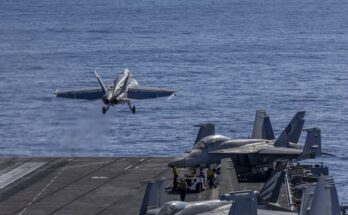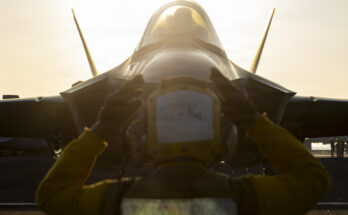
Boeing is offering a multibillion dollar industrial benefits package as part of its fighter jet pitch to Canada in hopes that support for domestic industry will give the company an edge in the competition. The contractor says Canadian companies could receive up to CAD30 billion ($22.5 billion) in work if Ottawa selects the F/A-18 Super Hornet as its next fighter. Canada wants to buy 88 aircraft to replace its existing CF-18 Hornets.
It was only earlier this month that Boeing confirmed its participation in the competition, as Ottawa recently changed the program’s industrial benefits parameters in order to allow Lockheed Martin’s F-35 to remain in the competition. Because of how the F-35 program is structured, Lockheed is unable to guarantee domestic work, which would normally be a problem since Canada’s defense procurement system requires domestic offsets. The change allows Lockheed Martin to participate without guaranteeing work for domestic manufacturers. Canadian firms have received CAD1.3 billion ($980 million) in F-35 work over the last 12 years, and Lockheed argues that opportunities will increase as F-35 fleets around the world grow in size.
Boeing’s more direct industrial benefits package will certainly boost to the company’s offering, but economic benefits only make up 20 percent of the bid evaluation. Cost will make up another 20 percent. Lockheed has been gradually bringing down the F-35 unit cost, but long-term maintenance costs for the F-35 are still higher than those of legacy aircraft. The remaining 60 percent of the bid evaluation will be based on technical merit. Critics have argued that the technical portion of the program favors the F-35, as the solicitation places an emphasis on strategic attack and ground attack overseas.
Saab’s Gripen fighter is also in the running, but the European aircraft is considered an underdog. Airbus pulled the Eurofighter Typhoon from the competition earlier this year, citing the industrial benefits policy changes and additional costs that would have been incurred due to NORAD security requirements. Dassault withdrew its Rafale fighter last year.
Final bids are due in the spring, and a winner will be selected by early 2022. Deliveries are expected to commence in 2025, assuming the program remains on track.
Shaun's deep-rooted interest in military equipment continues in his role as a senior defense analyst with a focus on the United States. He played an integral role in the development of Forecast International's U.S. Defense Budget Forecast, an interactive online product that tracks Pentagon acquisition programs throughout the congressional budget process. As editor of International Military Markets – North America, Shaun has cultivated a deep understanding of the vast defense markets in the United States and Canada. He is a regular contributor to Forecast International's Defense & Security Monitor blog and has co-authored white papers on global defense spending and various military programs.




